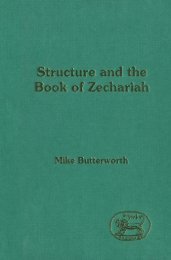Appendix CASE ONE - Collection Point® | The Total Digital Asset ...
Appendix CASE ONE - Collection Point® | The Total Digital Asset ...
Appendix CASE ONE - Collection Point® | The Total Digital Asset ...
You also want an ePaper? Increase the reach of your titles
YUMPU automatically turns print PDFs into web optimized ePapers that Google loves.
206 Legal History in the Making<br />
appoint an apparently unlimited number of local prosecutors was seen as<br />
an egregious opportunity for patronage. 21 It was an example, in Sir William<br />
Harcourt's words, of 'one of the most growing evils in this country, the<br />
centralization of patronage in the hands of the Executive Government'. 22<br />
In the eyes of one member it was an attempt to create a Ministry of Justice<br />
under another name. 23 It would be inefficient declared another since: 'All<br />
Treasury prosecutions partook more or less of jobbery and always cost too<br />
much'. 24 In the mind of one Tory member it would strike at the heart of the<br />
national character:<br />
<strong>The</strong>re was nothing which could be more prejudicial to the English character than<br />
to imitate the example of various foreign countries, and teach people to look<br />
to the Government for everything. If people would not look after their own<br />
property, it was not right that they should be able to ask the Government to do<br />
it for them. 25<br />
<strong>The</strong>re was opposition too from special interests and Harcourt declared that<br />
an earlier Liberal Bill had broken down because it had been opposed by: 26<br />
the most formidable body except the Licensed Victuallers, in the country - for<br />
everybody knows that they exercise an influence over hon. Members which is not<br />
equalled by any except Licensed Victuallers -1 mean Solicitors.<br />
<strong>The</strong>re was nevertheless, by this time, recognition among leaders on both<br />
sides of the House that action was needed and that, while traditional anxieties<br />
must be met, there was an overriding duty on Parliament to exercise the law.<br />
Farrer Herschell, later a Liberal Chancellor, reminded the House that 'every<br />
act which the law constitutes a crime is, as such, an offence not against the<br />
individual injured but against the community or State'. 27<br />
<strong>The</strong> compromise which emerged from the committee stage on the Prosecution<br />
of Offences Bill in 1879 was indeed a 'tentative' measure. When<br />
Sir John Blossett Maule Q.C. began work as the first Director of Public<br />
Prosecutions in January 1880 he, a single assistant, 28 and four clerks were<br />
temporarily housed in the Home Office building and empowered 'to institute,<br />
undertake and carry on such criminal proceedings as might be prescribed by<br />
regulations under the act or, in a special case, be directed by the Attorney<br />
General'. <strong>The</strong> Act imposed a further duty upon the Director to give advice<br />
to chief officers of police, clerks to justices and other persons in accordance<br />
21<br />
Mr. Williams, ibid., at col. 967.<br />
22<br />
Sir W.V. Harcourt, ibid., at col. 978.<br />
23<br />
Mr. Mitchell Henry, ibid., at col. 987.<br />
24<br />
Mr. Williams, ibid., at col. 967. Williams went on to cite the Tichbourne case citing the cost at<br />
over £100,000. In fact it only cost the still massive amount of £60,000, Report (1884), Evidence of A.<br />
Stephenson.<br />
25<br />
Mr. Floyer, Hansard (14 March 1879), at col. 984.<br />
26<br />
Sir W.V. Harcourt, ibid., at col. 978.<br />
27<br />
Sir F. Herschell, ibid., at cols. 973-74.<br />
28<br />
<strong>The</strong> Act did in fact authorize a maximum of six such assistants.






